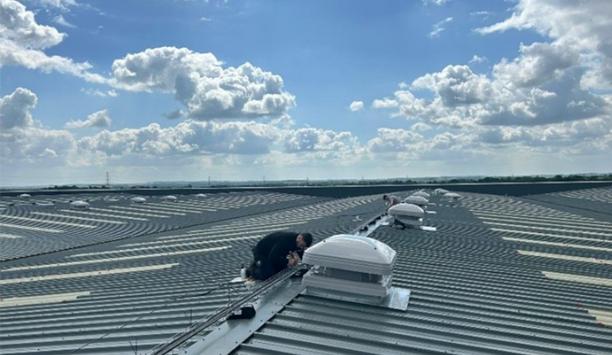Automotive HVAC is a heating, ventilation, and air conditioning system installed in automobiles, such as passenger cars, pickup trucks, and heavy-duty trucks. Like other air conditioning systems, automotive HVAC cools the air by transforming the refrigerant into a liquid or gas.
The heating process, on the other hand, is characteristic of automotive HVAC as it uses the heat created by the engine.
HVAC systems in the automotive
The adoption of heating, ventilation, and air conditioning (HVAC) systems in the automotive sector has been a revolutionary step in advancing automotive technology and efficiency.
It has become one of the key elements in the automobile industry, given higher temperature control needs due to recent climate changes, higher consumer interest in air purification, and higher efficiency requirements fueled by the growing adoption of electric vehicles.
future growth prospects
Projections forecast a potential worth of $86.1 billion by 2031, driven by a significant CAGR of 5.4%
Recent insights from Meticulous Research offer a glimpse of the future growth prospects of the Automotive HVAC Market.
Projections forecast a potential worth of $86.1 billion by 2031, driven by a significant Compound Annual Growth Rate (CAGR) of 5.4% from 2024 to 2031.
Components of Automotive HVAC
Automotive HVAC consists of the following main components:
- Compressor (Compressing refrigerant)
- Condenser (Cooling refrigerant)
- Receiver dryer (Removes impurities and moisture from refrigerant)
- Expansion valve
- Evaporator (Cools the air)
- Blower (Releases the air)
- Thermostat (Regulates temperature)
- Actuator (Switches air direction)
Increasing Demand for Thermal Systems Features
An HVAC system is equipped with air filtration and purification components that help remove pollutants
Automotive manufacturers are developing HVAC systems that play a crucial role in providing comfort and managing the overall environment of the vehicles. There is a growing adoption of HVAC systems that help regulate the temperature inside the vehicle cabin, ensuring passenger comfort regardless of external weather conditions.
These systems can heat the cabin during cold weather and cool it down during hot weather, providing a comfortable driving experience. Moreover, the HVAC system is equipped with air filtration and purification components that help remove pollutants, allergens, and odors from the cabin air.
Compact, intelligent, and flexible solution
With the increasing demand for thermal system features in vehicles, several companies are launching HVAC systems. For instance, in March 2023, SIROCO HVAC (France), an international provider of thermal and electrical solutions for industrial vehicles, launched its new 12-24V CAN/LIN bus HVAC electronic controller.
This controller is a compact, intelligent, and flexible solution to manage thermal systems. With component diagnostics, short-circuit protection and a safe start-up charger, the controller offers a complete and configurable solution for HVAC components and vehicle thermal management.
Rising Adoption of Electric Vehicles
According to the International Energy Agency (France), electric car sales in 2023 were 3.5 million higher than in 2022, a 35% year-on-year increase. This is more than six times higher than in 2018, just 5 years earlier.
An electric vehicle's range is strongly influenced by temperature, the battery type, and what HVAC loads are required to bring the cabin to comfort.
Heating and cooling
HVAC systems in an electric vehicle enhance energy efficiency and contribute to overall driving comfort
Heating and cooling are some of the most significant contributors to range reduction. HVAC systems in an electric vehicle enhance energy efficiency and contribute to overall driving comfort and performance. Electric cars benefit from rapid cabin heating or hot air cooling due to the electric compressor's instantaneous response.
This feature improves driver and passenger comfort, particularly in extreme weather conditions. Due to all such benefits, the adoption of HVAC systems in electric vehicles is increasing rapidly.
Integrate HVAC systems
Furthermore, the rising focus of automotive manufacturers to integrate HVAC systems in their electric vehicles for enhanced passenger comfort is expected to increase the demand for automotive HVAC systems. For instance, in May 2021, Panasonic Holdings Corporation (Japan) revealed that its Nanoe X technology will be used by Jaguar Land Rover (U.K.) in its future vehicle heating, ventilation, and air-conditioning (HVAC) systems.
Nanoe technology is currently being used in the entire Jaguar range, including the all-electric Jaguar I-Pace performance SUV, and in the Land Rover lineup, including the Discovery and Range Rover Evoque.
User-friendly climate control
In addition, several automakers are focused on improving HVAC efficiency in their vehicles. For instance, in April 2023, Kia (South Korea) announced that the Kia EV9 underwent testing to optimize heating, ventilation, and air conditioning (HVAC).
The thermal system of the Kia EV9 includes a heat pump, climate control system, and defrost and de-icing features. In addition, a new, user-friendly climate control panel and improved roof vents offer customers maximum comfort and convenience.
Integrating Automatic Climate Control Systems in Vehicles
Automatic climate control in cars is an advanced system that enables independent regulation of cabin temperature
Automatic climate control in cars is an advanced system that enables independent regulation of cabin temperature and humidity. By controlling the airflow, distribution, and temperature inside the vehicle, it offers personalized comfort. It operates autonomously and ensures optimal conditions for passengers while eliminating any fogging on the windows or the windshield.
This technology is prevalent in most mid-range cars. It enhances the driving experience by allowing individual temperature settings and automatic adjustments of the fan speed and air circulation.
Air conditioner in a car
Earlier, the air conditioner in a car was considered one of the biggest features. Today, air conditioners have become standard equipment, even in entry-level automobiles. The desire for comfort and luxury has led to the development of climate control systems inside an automobile. Several automotive manufacturers are adding climate control features to their vehicles.
For instance, in April 2024, Mahindra & Mahindra (India) launched the much-anticipated Mahindra XUV 3XO in the Indian market with updated design, features, and safety enhancements. The XUV 3XO introduces several first-in-segment features, including Climate Control.
Automotive HVAC Market: Key Companies
Some of the key players operating in the automotive HVAC market are Johnson Electric Group (Hong Kong), MAHLE GmbH (A Subsidiary of Mahle Stiftung GmbH) (Germany), Sensata Technologies, Inc. (U.S.), DENSO Corporation (Japan), Hanon Systems (South Korea), Valeo Service SAS (France), Air International Thermal Systems, Inc. (U.S.), Sanden Corporation (Japan), Brose Fahrzeugteile SE & Co. KG (Germany), Keihin North America, Inc. (U.S.), Mitsubishi Heavy Industries, Ltd. (Japan), OMEGA Environmental Technologies (U.S.), Kongsberg Automotive ASA (Norway), and Gentherm Inc. (U.S.).
The automotive HVAC market has witnessed various product portfolios, geographic presence, and key growth strategies adopted in the last three to four years, comprehended in the report by Meticulous Research.
High Market Growth Anticipated in the Asia-Pacific Region
Asia-Pacific is expected to register the highest CAGR of 6.5% of the global automotive HVAC market
The Asia-Pacific market is probably going to observe huge development in the automotive HVAC market. According to recent market analyses of the Automotive HVAC Market, in 2024, Asia-Pacific is expected to register the highest CAGR of 6.5% of the global automotive HVAC market.
The increasing demand for passenger vehicles in India, China, and other countries in the Asia-Pacific region, the rising demand for energy-efficient HVAC systems across several automotive manufacturers, growing preferences for passenger comfort and safety, rising automobile production, rising disposable incomes, and growing efforts by market players to launch innovative products is boosting the market growth.
Developments from Key Industry Players in Asia-Pacific
- In September 2023, DENSO Corporation (Japan) launched Everycool, an advanced cooling system that provides comfort and energy efficiency when a commercial vehicle’s engine is off. It can also be used when a truck's engine is not running. Everycool achieves the dual objective of improving driver working conditions during hot summer seasons, reducing environmental impact, and promoting efficient energy utilization by lowering fuel consumption.
- In March 2022, Hanon Systems (South Korea) announced a plan to build a new plant in Hubei, China, where the company will start producing HVAC modules and other products for electric vehicles (EVs) in early 2023.
Automotive HVAC: Key Takeaways and Future Outlook
The automotive HVAC market is in the midst of a revolutionary transformation driven by technological innovation, environmental consciousness, and the changing landscape of the automotive industry.
As automakers strive to meet consumer demands for greener, more efficient, and technologically advanced vehicles, the automotive HVAC market stands at the forefront of innovation, contributing to a cooler, cleaner, and more comfortable driving experience. This comprehensive overview of the Automotive HVAC Market from Meticulous Research provides a valuable perspective on the evolving landscape and its future directions.


















